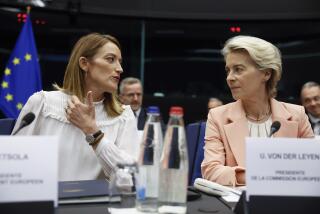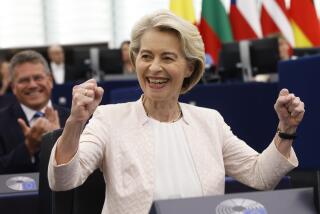EUROPE : Dutch Leader Bows Out as Step Toward Role on Larger Stage
- Share via
BRUSSELS — While the strong showing of minor parties in the Dutch national elections earlier this week was big news in the Netherlands, it is another development from the poll that is likely to cause the greatest ripples beyond the country’s borders.
The vote that has also brought the Netherlands a new dominant party after nearly 12 years signaled the end of national politics for one of Europe’s longest-serving and most popular leaders, Prime Minister Ruud Lubbers.
Lubbers’ decision to retire from the national scene--a decision he announced well before the elections--is one step in a larger political drama that centers on the succession to what is, at least potentially, one of the most powerful jobs on the Continent: president of the European Union’s Executive Commission.
Lubbers reportedly wants the job and is now free to pursue it actively.
Indeed, the ballots were still being counted Tuesday as the Dutch government announced that it will formally propose him as a candidate to succeed the incumbent president, Frenchman Jacques Delors, whose term expires at the end of this year.
Delors’ successor is expected to be chosen by the 12 European Union leaders--collectively known as the Council of Ministers--at their next summit meeting, scheduled for the end of June in Corfu.
The head of the Union’s Executive Commission exerts enormous influence in shaping the direction of EU policy, in addition to administering a budget of nearly $80 billion and running an army of 10,000 pampered employees known as Eurocrats.
During Delors’ decade on the job, the European Union has grown from a tentative, incomplete customs union into a single, unified market committed to the goals of political and monetary union.
The next commission president faces a series of daunting tasks. These include finding ways to eliminate the barriers that still separate the affluent EU nations from the former Communist states of Central and East Europe and to steer the Union intact through a potentially explosive 1996 review of the Maastricht Treaty, the accord that commits member states to political and monetary union.
Delors’ successor must also consolidate the union’s enlargement if Norway, Sweden, Finland and Austria join as planned next Jan. 1.
Lubbers, 54, has frequently been mentioned as a logical choice for the task. His 11 1/2 years as a head of government, his commitment to federalism and the European ideal give him excellent credentials. His pedigree as a politician representing the moderate right from a small country also fits well as a successor to Delors, a French socialist.
Delors himself openly endorsed Lubbers as his successor about 18 months ago as “the right person in the right place.”
“He is a true European, has fresh ideas and is capable of innovation,” Delors told a radio interviewer.
But the Dutchman is no shoo-in. Some of those most familiar with the nature of EU decision-making argue that Lubbers, once the acknowledged favorite, now faces an uphill battle for the post.
These sources note reports that the Union’s two biggest powerbrokers, German Chancellor Helmut Kohl and French President Francois Mitterrand, have cooled on Lubbers and agreed to back the lesser-known Belgian prime minister, Jean-Luc Dehaene.
Dehaene, a year younger than Lubbers, is considered a skilled negotiator and an instinctive consensus-builder who impressed nearly everyone with his adept handling of the Union’s affairs during the second half of last year when Belgium held the Council of Ministers’ rotating chair.
The names of at least two other prominent figures have also been mentioned as possible candidates: Irish national Peter Sutherland, who, as the head of the General Agreement on Tariffs and Trade, managed to bring the recent world trade talks to a successful conclusion, and Leon Brittan, the EU’s chief negotiator in those talks.
Brittan, although exceptionally well qualified for the job, is viewed skeptically by continental EU leaders, in part because he served loyally for seven years as a Cabinet member under former British Prime Minister Margaret Thatcher, who made a sport out of belittling the EU’s unity goals.
More to Read
Sign up for Essential California
The most important California stories and recommendations in your inbox every morning.
You may occasionally receive promotional content from the Los Angeles Times.













